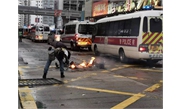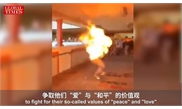'Escape Day' for mainland students after HK university campus becomes war zone
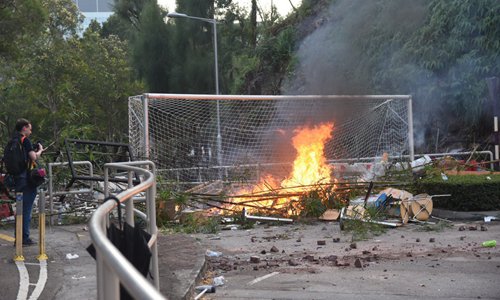
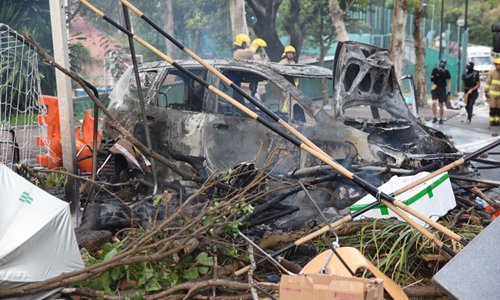
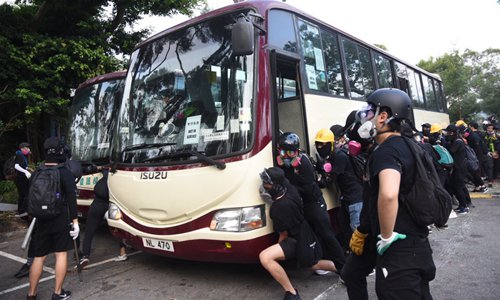
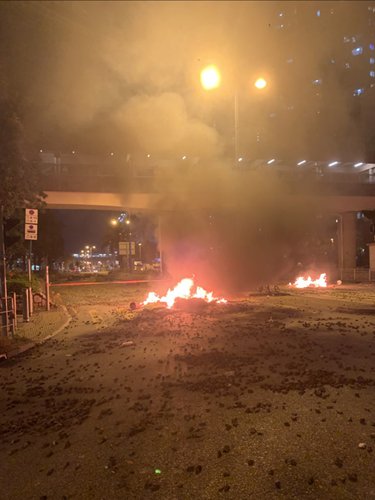
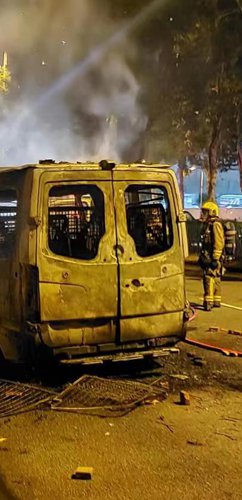
Radical protesters turn China University of Hong Kong (CUHK) into a war zone on November 12, which is dominated by a huge fire and smoke. Photos: Web
The Chinese University of Hong Kong (CUHK) turned into a war zone Tuesday night, dominated by a huge fire and smoke, road barricades and fierce confrontation between rioters and police. Such terror-like scenarios forced hundreds of students to escape from a city entangled in escalated violence.
Earlier on Tuesday, protesters at CUHK threw objects onto Tolo Highway and an MTR track, seriously threatening people's safety. To stop such illegal acts, Hong Kong police moved in to disperse the crowd, but faced a fierce standoff with protesters at an entrance of the Sha Tin campus.
Student protesters also stormed a storeroom on campus and stole bows, arrows and javelins. Some mainland students also said groups of rioters besieged their dormitories and spray-painted insulting words on the walls.
When night fell, the situation began to get out of control, as rioters threw Molotov cocktails toward police, set fire to vehicles and resisted police.
For mainland students in Hong Kong, it has been a tough week since the death of a local student became an example used by opposition groups to distort the narrative of police enforcement. Some decided to leave the university for Shenzhen, the neighboring city.
A female student began her "retreat journey" around 6:30 am Tuesday while rioters launched a second day of a citywide general strike. As she was afraid rioters would again block the roads by setting up barricades, she decided to go back to Shenzhen, South China's Guangdong Province, as early as possible.
During the past week, black-clad radicals, many of whom are university students, shifted their strategies from street protests to campus violence. Chow Tsz-lok, a 22-year-old computer science undergraduate from the Hong Kong University of Science and Technology (HKUST), died on Friday morning from brain injuries after earlier falling from a parking garage.
Following that incident, protest organizers tried to create a diversion by blaming others, applying pressure on the university and disturbing the student congregation while rioting on campus. Some rioters vandalized facilities, ransacked a professor's office and the school president's home in the name of "mourning Chow."
Meanwhile, they have been targeting mainland students, Chinese banks and some specific restaurants and stores, as hatred and distrust of the central and Hong Kong Special Region Administrative governments has become more palpable among rioters in the months of social unrest.
"My parents are worried. They asked me to take a break and come back to the mainland," the female student who just came to enroll at a Hong Kong university this fall, told the Global Times.
She preferred not to be named due to concerns of online doxxing, which has become common as protesters expose personal information of those who disagree with them.
On her way to Shenzhen Bay Customs, she was petrified when passing Hong Kong PolyTechnic University as she saw mobs throwing metal batons from a footbridge.
The student was not the only one who is terrified of "out of control" mobs as they set fire to an MTR train, attack innocent people who disagree with them, and even set fire to a man who said, "We are all Chinese."
Some mainland students began to flee Hong Kong, a city now in chaos as the rampage goes on. Another male student left Hong Kong on Saturday and stayed in a hotel in Shenzhen for several days, as his university cancelled classes.
He told the Global Times that he was attacked by a group of rioters a few weeks ago when he took photos of black-clad rioters putting up a Lennon Wall. "Why can't I take pictures at a public place?" the student asked.
With social disturbances in Hong Kong weighing on students' daily life, mainland students were stuck at the college on Tuesday night, as rioters blocked several major exits from the school.
"This is like escape, but from our own country to our country," the student said, noting that more classmates are becoming aware of the escalating violence that may lead to serious consequences. "We need to protect ourselves," he added.
By staying in Shenzhen, the student said he feels more relaxed. However, when he sees someone wearing a black mask or dressing in back, he said he feels uncomfortable.
Dozens of mainland students have now arrived in Shenzhen, some staying at hotels while waiting for further instructions. Some are PhD students who are trying to help undergraduates and graduates, as some arrived in Hong Kong just this fall.
As of midnight, there were still 200 students at CUHK needing to be rescued. Some tried to walk out of the school as major entrances have been blocked. Others are very anxious and want to escape as soon as possible.
Of 287 suspects arrested by police on Monday, nearly two-thirds were students, which is very worrisome, according to police.
Some warmhearted local residents have organized an online group, arranging cars to pick up mainland students at CUHK. Outspoken legislator Junius Ho told the Global Times that he is willing to help, urging the city to get back to normal as soon as possible.
